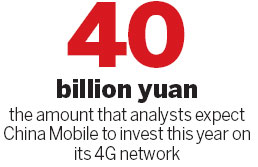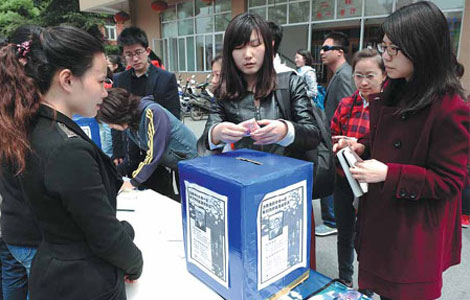Ericsson eyes China's new 4G network tender
Updated: 2013-05-08 05:50
By Shen Jingting (China Daily)
|
|||||||||||
Telecom equipment maker Ericsson AB expects to boost its performance in China after the country's new round of bidding for its fourth-generation mobile network, senior company officials said.
The construction of China's 4G network has been a bright spot for companies against the backdrop of a weak global economy and sluggish spending by most telecom carriers.
China Mobile Ltd, the world's biggest telecom operator by subscribers, said recently that it would launch a new tender for 4G equipment soon. The company plans to have 200,000 Time Division-Long Term Evolution, or TD-LTE, base stations in more than 300 Chinese cities this year. Analysts expect China Mobile's 4G investment to surpass 40 billion yuan ($6.44 billion) this year.
Previously, Mats H. Olsson, senior vice-president of Ericsson Asia-Pacific, said he was not satisfied with the results that Ericsson achieved in China Mobile's first-round of bidding for 4G equipment last year.
Ericsson achieved an 8.1 percent share during the first round of bidding for China Mobile's TD-LTE tender in 2012, while Chinese rival Huawei Technologies Co won a 23.8 percent share and ZTE Corp took 22.1 percent, according to figures from research firm IHS iSuppli.
"Ericsson is confident that it will gain a much bigger share during China Mobile's new round of bidding," Eric Feng, executive vice-president of Ericsson North East Asia, said at a news briefing in Guangzhou on Tuesday.
As the world's largest wireless network equipment maker, Ericsson has the technology and the experience to meet China Mobile's 4G demand, Feng said. More than half of the world's LTE traffic is generated from networks developed by Ericsson, he added.

"After Chinese telecom operators stopped further investments in their 2G mobile networks, the 4G business became even more important for Ericsson," Feng said. He expects China Mobile's 4G projects to significantly boost Ericsson's performance in China, but declined to provide specific figures.
Pricing strategies of foreign players was one of the reasons behind their failure to beat local rivals, said Zhao Hailin, an analyst at IHS iSuppli. Ericsson's telecom equipment usually is more expensive than that of Chinese companies, Zhao added.
Meanwhile, Ericsson's limited participation in China Mobile's 3G network deployment may become another factor hindering its progress in the carrier's 4G network.
Xi Guohua, China Mobile's chairman, said that the company's new 200,000 TD-LTE base stations will be either built from scratch or upgraded. China Mobile adopted the domestic TD-SCDMA technology for its 3G equipment, and most of its 3G base stations were built by Chinese companies such as Huawei and ZTE.
Therefore, Ericsson will very likely lose the bidding for any upgrade projects for China Mobile's 3G base stations, and instead will focus on building brand-new 4G stations.
"We hope that China Mobile will consider deploying all of its 4G base stations via new construction projects, because it's more efficient, powerful and has a similar cost to upgrades," Feng said.
So far, China Mobile has not said how many base stations will be built or upgraded.
Related Stories
Ericsson to acquire Microsoft's IPTV unit 2013-04-10 10:29
Huawei set to beat Ericsson 2013-01-22 09:35
Ericsson inaugurates new global services center in Xi'an 2012-10-24 13:41
Ericsson Nest Forum unites education and broadband 2011-11-15 15:44
Ericsson staffing up to garner more mainland business 2011-11-15 10:12
Today's Top News
Detention of petitioners denounced
Lawyers get an advocate
Pentagon accusation on China's military rejected
Foster homes for homeless children
Public hearing to discuss taxi fare increase
21 Party officials, SOE managers disciplined
Clarity on tax evasion needed, lawmakers told
Visa policy to attract global tourists
Hot Topics
Lunar probe , China growth forecasts, Emission rules get tougher, China seen through 'colored lens', International board,
Editor's Picks

|

|

|

|

|

|





